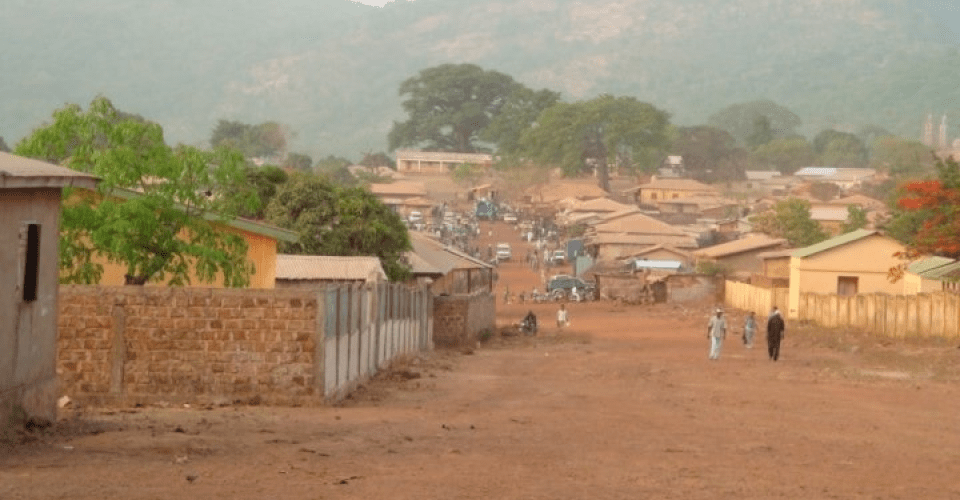
GUINNOVATION is partnering with the local community of Yembering (Guinea) and expatriates in Europe, Canada and the USA to provide electrification for a small, rural health center. Yembering Health Center has moved from reliance on flashlights and kerosene lamps to high-efficiency LED-based light bulbs powered by 10 newly installed solar panels.Guinnovation’s next step is to acquire needed medical equipment and establish community health education. You are invited to review a detailed description below, which we hope will move you to make a donation!
Yembering is a sub-prefecture located in the mountainous prefecture of Mali in the Labe region of northwestern Guinea – the country where the Ebola outbreak began. Guinnovation recently implemented a solarization project that now provides electricity to power equipment and lighting at the Yembering Health Center.
Yembering is home to a rural community of 35,000 residents, including 4500 elementary and high school students, spread across seven administrative districts. The Yemberlng Health Center serves that population with only two permanent staff — a doctor and a nurse. With electrification completed, Guinnovation hopes to dramatically improve the health center’s ability to serve Yembering’s needs.
Solarization project
The project originated with Guinnovation board member Abdoul Diallo and his father. Abdoul’s parents had retired to Yembering, where their home was across from the health center. A 5-year-old niece was taken there one night for emergency treatment. Because of a lack of electricity, she had to be evacuated to the capital city, Conakry, and died there. The experience inspired Abdoul and his father to launch an effort that culminated in collaboration with Guinnovation for the solarization project.
Electrification is phase one of a three-phase strategy to bring health care stability to Yembering. A study was undertaken comparing generator versus solar power. It determined generators would be less expensive to install, but lower ongoing expense made solar more cost-effective over the long term.
With enthusiastic support from Guineans living in Africa, Europe, Canada, and the United States, funds were raised to deliver and install 10 solar panels and their associated components. Loura-Solaire, a local Guinean company in Conakry, was selected to purchase and transport the solar panels from the U.S., then deliver and install them at the Yembering center. The contractor assembled a quality team to verify that the installation met required objectives.
Yembering health center
In existence since 1970, the health center’s small complex of cinder block buildings recently received exterior and interior renovations. The facility includes space for consultation and receiving patients; a surgery for simple procedures; a labor and delivery room; a pharmacy; a laboratory for blood and stool analysis; the doctor’s and nurse’s offices; and a morgue for same-day burials.
The delivery of comprehensive patient services had been hindered by lack of electricity and a shortage of medical equipment. Previously, the center was powered with one small solar panel providing electricity to a single light bulb for about three hours per day. Care after dusk was provided using flashlights and kerosene lamps. The center is now able to light and power its operations.
A key element is high-efficiency LED-based bulbs that are as bright or brighter than conventional light bulbs for illuminating all the facility’s operating areas. Estimates are that the solar installation will supply daily power for 45 11-watt/220-volt light bulbs for eight hours; a microscope for six hours; a portable computer for two hours; a printer for one hour; and a sterilizer.
Catalyst for improvement
Health center workers continue to lack the necessary equipment to provide proper care or protect themselves when performing certain procedures. The center’s effectiveness is limited by a lack of community health education. But the new electrification and lighting is expected to be a catalyst to hasten improvements.
Guinnovation, in partnership with the local community in Mali prefecture and supporters abroad, will plan and receive proposals, raise necessary funds, and verify the success of each improvement phase. Guinnovation will utilize our contacts in Guinea to obtain the necessary permissions and clearances from the government of Guinea. The successful electrification stands as tangible evidence to the people of Yembering that Guinnovation is committed to ongoing improvements.
Equipment and supply needs
Phase two will assist the Yembering center in obtaining equipment and supplies to satisfy basic health care needs. The center now operates with minimal medical capabilities. Guinnovation will appeal to current and new supporters to obtain basic operational equipment and supplies. Needs include mattresses and bed sheets; a surgical/examination light; medical gowns; surgical tools; an autoclave (surgical sterilizer); a baby scale; medical gloves and glasses; a post-partum pad; and OB/GYN tools.
Community health education
Phase three, our community education effort, is where we expect to put Yembering on a firm path to health stability. The strategy will be to enlist and train from the broader community volunteers to educate the populace in such basic practices as hand-washing, hygiene, sanitation and proper food storage. We will seek out the best educated leaders and individuals to assist in recruiting volunteers from all segments and ages, including (and especially) teachers and students.
Local doctors and nurses will be key in developing a curriculum for public health education campaigns. A major emphasis will be on educating the population about preventative measures and the treatment of indigenous diseases, including the ongoing threat from Ebola.
Model for rural Guinea
As public awareness takes hold — inspiring effective preventive practices and early detection of danger signs — the Yembering Health Center’s mission will be less crisis intervention and more about maintaining a stable community health environment. Yembering can be a model for replicating across rural regions of Guinea as part of a larger effort to transform lives through health education and disease prevention.
